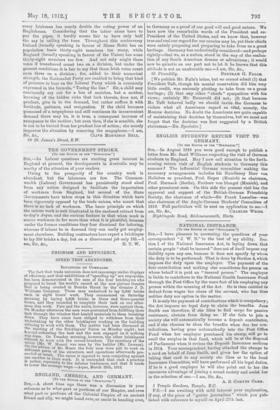THE GOVERNMENT STROKE.
[TO TEE EDITOR OP TRY "SPECTATOR."]
Stn,—As Labour questions are exciting great interest in England at present, the developments in Australia may be worthy of the attention of your readers.
Owing to the prosperity of the country work is abundant, but the labourers are few. The Common- wealth (Labour) Government has persistently stood aloof from any action designed to facilitate the importation of workmen from England, but several of the State aovernments have taken steps in this direction which have been vigorously opposed by the trade unions, who assert that there is no lack of workmen. The basic principle on which the unions work is well illustrated in the enclosed extract from to-day's Argus, and the curious feature is that when work is scarce workmen do far more than when it is plentiful, because under the former conditions they fear dismissal for loitering, whereas if labour be in demand they can easily get employ- ment elsewhere. Building contractors here expect a bricklayer to lay 350 bricks a day, but on a Government job only 185.-1 UNIONISM AND EFFICIENCY.
SPEED TEST ABANDONED.
BOYCOTTED BY COMRADES.
Tho fact that trade unionism does not encourage undue displays of efficiency, and that exhibitions of "speeding up" are unpopular, has been demonstrated in the case of the four bricklayers who proposed to break the world's record at the now picture theatre that is being erected in Bourko Street by the Greater J. D. Williams Company. Those men undertook to lay 3,000 bricks each in eight hours' work. They commenced on Saturday morning by laying 5,608 bricks in throe and three-quarter hours, and they intended to complete their task on ono after- noon this week. Fate and the union, however, were against thorn. On Monday afternoon the men were prevented from fulfilling their task through the winches that hauled materials to them breaking down. They have since boon obliged to withdraw from thoir undertaking by the other bricklayers working on the building refusing to work with them. Tho matter had been discussed at the meeting of the Bricklayers' Union on Monday night ; but b3yond ridiculing the task and the men engaged on it nothing Was done, On Tuesday morning, however, the other bricklayers refused to work with the record-breakers. Tho secretary of the union (Mr. W. Mears) was soon by the builder (Mr. Lawson). On the advice of Mr. Mears the four mon wore put to work on different parte of the structure, and operations afterwards pro- ceeded as usual, The union is opposed to mon competing against one another in their work. It is contended that such a practice Is unfair, especially to the inferior tradesmen, and that it tends to lower the average wago.—Argus, March 29th, 1912.










































 Previous page
Previous page